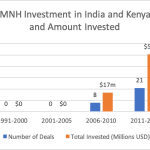Summer of Impact Investing: ImpactAlpha Flags 10 Recent Developments Shaping the Sector
Editor’s note: NextBillion is collaborating with ImpactAlpha to highlight coverage of the top stories, leaders and trends in impact investing. In periodic NextBillion posts, their team will share the key stories and market activities that have crossed their desks in recent weeks.
Summer of Impact
British voters have thrown a stick through the spokes of globalization with their vote to Brexit. Perhaps though, the options were too stark: stay or leave? What if redefine, or even re-imagine, were also on the ballot?
That’s the ethos driving the spread of impact investing, the global movement of investors, entrepreneurs, development agents and philanthropists attempting to remake capitalism to deliver more broadly distributed economic, social and environmental gains. The movement is attracting mainstream proponents from the finance world, and there are signs that its vision of a more sustainable, inclusive prosperity, powered by market-based models, is starting to penetrate the political debate as well.
World leaders on the summer conference circuit have been touting impact investing and global entrepreneurship as part of the solution to the myriad economic, social and environmental before us.
“In today’s world, where our economies have undergone dramatic shifts, where business doesn’t stop at borders, where technology and automation have transformed virtually every industry and changed how people organize and work, entrepreneurship remains the engine of growth,” said President Obama, addressing the Global Entrepreneurship Summit at Stanford University, in what was his first post-Brexit speech.
“We’ve got organizations like Endeavor, which supports entrepreneurs, starting a $100 million fund to invest in companies across Latin America, and the Middle East, in Africa, and Southeast Asia,” continued Obama. “Investment firms like Capria Ventures, which will help fund international startups.
“So all of you budding entrepreneurs … Connect with your fellow innovators. Because ultimately the world needs your creativity, and your energy, and your vision. You are going to be what helps this process of global integration work in a way that is good for everyone and not just some.”
Impact Investing Comes to the Vatican
“May private investments, united with those of the public sector, favour the eradication of poverty among so many emarginated people,” said Pope Francis in his address to participants at the Second Vatican Conference on Impact Investing, held June 26th – 28th. Francis has openly embraced impact investing’s social and financial tenets; many Catholic institutions see it as a way to pursue their social missions in a more sustainable way.
“The Catholic Church’s commitment to impact investing is a pivotal moment for the field, as it not only brings new financial resources to bear on solving the world’s most intractable problems, but it sends a powerful message that impact investing is an effective tool to support the ethical and moral mission of the Church,” said Omidyar Network’s Matt Bannick, who was on hand for the event.
Global entrepreneurs mute Silicon Valley’s “PROBLEM PROBLEM”
For a few days last month Silicon Valley’s oft-criticized focus on solving problems of the privileged [see: restaurant delivery] took a back seat, as global entrepreneurs and investors addressing everything from the needs of refugee communities to those of the global unbanked descended on Stanford for the 7th Global Entrepreneurship Summit. ImpactAlpha spotlighted a number of deals and fundraises announced at the Summit in a special edition of our #dealflow.
Investing in America’s housing, infrastructure… and youth
At the Clinton Global Initiative America in Atlanta, the conference spotlighted social enterprises as job creators, green infrastructure, and fintech – an industry exploding across the U.S. Investors and participants committed to mobilizing capital to make affordable housing more healthy and green, launching new small business loan tools, and scaling businesses that employ young adults as they return from incarceration.
Will the top 100 to 200 wealthiest families become impact investors?
That’s the goal of the ImPact, a new network aiming to make impact investing the new normal among wealthy families, CEO Abigail Noble told ImpactAlpha for our report on the ImPact’s launch. The ImPact, founded by a who’s who of wealthy millennials, kicked off a #MakethePact campaign last month calling on ultra wealthy families to look at the impact across their portfolios and begin to make, or make more, impact investments. ImpactAlpha spotlighted the ImPact’s series of impact investing asset class primers, including frameworks, fixed income, public-equity, early-stage and real asset investing. Noble also sat down with David Bank for ImpactAlpha’s ROI Podcast.
Social impact bonds bring rare moment of agreement to the U.S. Congress
The U.S. House of Representatives unanimously passed legislation last month that, among other things, would create a $100 million fund within the Treasury Department to conduct social impact bond (SIB) feasibility tests, enter into SIB contracts with state and local governments and support SIB evaluations. And this month, Social Finance released its first “state of the market” report covering 60 SIBs in 15 countries, with data on 22 projects, alongside what it calls the “most comprehensive online database of Social Impact Bonds worldwide.” This follows Non-Profit Finance’s look at lessons from the first 10 U.S.-based SIBs. The takeaway? The outcomes are mixed but the model appears to be working: risk is shifting to private investors to the benefit of taxpayers. Bonus: The first-year results are in for the India-based Educate Girls development impact bond, the world’s first (DIB), aimed at enrolling girls in school and improving outcomes. The results are positive: after one year the DIB is on track to meet its 2018 targets.
Obama the impact investor?
Okay, it’s too soon to say but Obama did tell Bloomberg in a recent interview, “the conversations I have with Silicon Valley and with venture capital pull together my interests in science and organization in a way I find really satisfying.”
The notion of Obama as an investor is intriguing – but Village Capital’s Ross Baird sounds a cautionary note. “Don’t be a VC,” Baird wrote in an open letter to the President in response to the Bloomberg Q&A, “at least not how Silicon Valley defines it.” If you enter venture capital, says Baird, back entrepreneurs solving problems that matter, those who are left out of the mainstream innovation economy (returning veterans, people in “flyover country,” people of color, women, rural entrepreneurs, and re-entering members of society), and those partnering with government to solve issues related to the public good.
Measuring impact: part of the new cost of doing (good) business?
Business people have long complained about the burden of financial reporting. “But it is a crucial part of being able to raise money and attracting investment,” says Sir Ronald Cohen – and the same will hold true for impact investment. As the industry standardizes measurement practices, the burden will decrease. Ivy So and Alina Capanyola take a systematic look at how leading impact investors are measuring impact in their recent SSIR article.
There are a raft of new tools and initiatives to make such reporting easier, from CapRock’s release of iPar to the GIIN’s IRIS 4.0. But, argue Kate Ruff and Sara Olsen in SSIR, it is analytics, not standard measures, that will help overcome impact investing’s apples to oranges “comparison problem,” opening the way for a new professional class of impact analysts.
New templates aim to make impact deals easier
Measuring impact investments may be getting simpler, but doing impact investment deals is still a hand-tooled process, and is often complicated (and expensive). Two new projects, the Impact Terms Project and Echoing Green’s Seed Impact Investment Template Note, or “SeedIIT,” aim to equip impact investment dealmakers with legal language and templates to forestall confusion and conflict down the road.
Tracking new theses, markets and signals
From Obvious Ventures’ new $123,456,789 fund to invest in “world positive” businesses, to Capria’s new $100 million fund to back emerging fund managers in Africa, Latin America and Asia, impact investors are developing new investment theses. From tech jobs in Africa to agriculture in South Asia, new sectors and geographies are attracting capital from impact investors like the Chan Zuckerberg Initiative, Pi Investments, and Mercy Corps’ Social Ventures Fund. ImpactAlpha looks at these developments, along with the new reports and studies shaping impact investor perspectives and action in our latest #Shifts: New Theses, Markets and Signals Guiding Impact Investors, powered by ImpactAlpha’s #dealflow.
Photo credit: Ron Kroetz, via Flickr.
Dennis Price is a contributing writer for ImpactAlpha.
- Categories
- Investing, Social Enterprise



